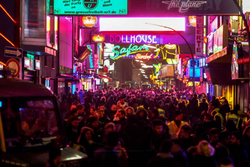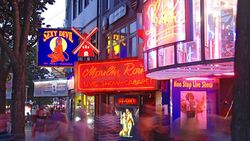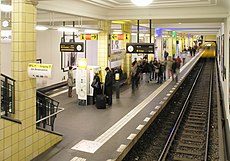Landherrenallee: Difference between revisions
| (7 intermediate revisions by the same user not shown) | |||
| Line 12: | Line 12: | ||
[[File:Reeperbahn-03.jpg|250px|thumb|right|Signs of brothels and sex shops on the ''Tholstenstraße'']] | [[File:Reeperbahn-03.jpg|250px|thumb|right|Signs of brothels and sex shops on the ''Tholstenstraße'']] | ||
===Sexual | ===Sexual services=== | ||
The street is home to various famous {{wp|eroticism|erotic}} establishments and localities dealing with {{wp|sexual intercourse|sexual affairs}}. The ''Das Loch'' features {{wp|table dance}} and {{wp|sex show|sex shows}} as one of four live sex theatres in the country and the counterpart to ''Spaßritz'', another establishment targeted at live shows and certain {{wp|fetish|fetishes}}. {{wp|BDSM}} activites are also represented and offered on the Landherrenallee. From 1979 to 1994, the ''Feuchthaus'' was the largest brothel at the time in Erdara with four floors, until it was divided into three successors following a police raid involving the drug trafficking of {{wp|cocaine}}. Brothels tend to display sex workers, mainly women, in sexual positions behind their front windows to attract costumers; however the number of shops allows for a variety of different sexual preferences and has met the desires of up to 270,000 tourists and thrillseekers in 2019, making the local sex industry the largest and most profitable economic sector of the Landherrenallee area. Apart from these, there are also numerous sex shops, dating clubs, and free {{wp|prostitution|prostitutes}} and street-based sex workers. | The street is home to various famous {{wp|eroticism|erotic}} establishments and localities dealing with {{wp|sexual intercourse|sexual affairs}}. The ''Das Loch'' features {{wp|table dance}} and {{wp|sex show|sex shows}} as one of four live sex theatres in the country and the counterpart to ''Spaßritz'', another establishment targeted at live shows and certain {{wp|fetish|fetishes}}. {{wp|BDSM}} activites are also represented and offered on the Landherrenallee. From 1979 to 1994, the ''Feuchthaus'' was the largest brothel at the time in Erdara with four floors, until it was divided into three successors following a police raid involving the drug trafficking of {{wp|cocaine}}. Brothels tend to display sex workers, mainly women, in sexual positions behind their front windows to attract costumers; however the number of shops allows for a variety of different sexual preferences and has met the desires of up to 270,000 tourists and thrillseekers in 2019, making the local sex industry the largest and most profitable economic sector of the Landherrenallee area. Apart from these, there are also numerous sex shops, dating clubs, and free {{wp|prostitution|prostitutes}} and street-based sex workers. | ||
| Line 19: | Line 19: | ||
==Streetscape== | ==Streetscape== | ||
===Map=== | |||
[[File:Landherrenalle main street map 2010.png|900px|thumb|center|Map of the Landherrenallee main street and notable establishments, landmarks and locations]] | |||
===Gallery=== | ===Gallery=== | ||
| Line 30: | Line 32: | ||
Reeperbahn_at_dawn.jpg|Central Landherren-<br>allee scenery at dawn | Reeperbahn_at_dawn.jpg|Central Landherren-<br>allee scenery at dawn | ||
Schlagermove_2015_08.jpg|The ''Gerhard-Schuhmacher-Platz'' during the ''Volldröhn'' festival (June 2019) | Schlagermove_2015_08.jpg|The ''Gerhard-Schuhmacher-Platz'' during the ''Volldröhn'' festival (June 2019) | ||
Sankt_Pauli_(8273672883).jpg|The street diverging with the | Sankt_Pauli_(8273672883).jpg|The street diverging with the ''Kaisern-Anneliese-Straße'' in the west | ||
</gallery> | </gallery> | ||
| Line 45: | Line 47: | ||
==Traffic connection== | ==Traffic connection== | ||
[[File:Traffic sign Landherrenallee.png|280px|thumb|right|Landherrenallee street sign]] | [[File:Traffic sign Landherrenallee.png|280px|thumb|right|Landherrenallee special street sign (adopted 1991)]] | ||
[[File:U-Bahnhof Berlin Friedrichstraße vom südlichen Zwischengeschoss.jpg|230px|thumb|left|The underground S-Bahn station ''Landherrenallee'' platform for the S8 as of 2017]] | [[File:U-Bahnhof Berlin Friedrichstraße vom südlichen Zwischengeschoss.jpg|230px|thumb|left|The underground S-Bahn station ''Landherrenallee'' platform for the S8 as of 2017]] | ||
The Landherrenallee is a feeding road of the | The Landherrenallee is a feeding road of the [[Transport in Mascylla|H7]] or ''Kaiserin-Anneliese-Straße'' in the north-west, diverging into the [[Transport in Mascylla|H7]] road at the ''Neckentor'', while in the south-east it runs to the ''Gerhard-Schuhmacher-Platz'', at which after the intersection with the ''Maximilian-Doppler-Chaussee'' it extends to Ahndau-Neustadt as the ''Hahnenstraße''. | ||
There are four bus stations (''S-Landherrenallee'', ''Ellisstraße'', ''Fackplatz'' and ''Agnoliaplatz'') and two tram stations (''S-Landesherrenallee'' and ''Agnoliaplatz'') on the Landherrenallee. Construction on a fifth and third bus and tram station respectively ("''Briesenfelde''") has begun in July 2019. The tram lines 21, 24, 30, and the bus lines A4, 364, and 269 serve the area along its axis. The underground S-Bahn station ''Landherrenallee'' serving the lines S2 and S8 and as a major public transport hub for the area is on the western end of the street; a second station with [[Königsreh U-Bahn|U-Bahn]] connection on the eastern end is planned to be built at the ''Fackplatz'', expected to be finished in early 2020. The [[Königsreh U-Bahn|U-Bahn line U3]] will be diverted for that role. Public transport stations are more strictly controlled by [[Imperial Police (Mascylla)|Police]] forces and PT security mainly due to its low personal safety and a high crime potential. | There are four bus stations (''S-Landherrenallee'', ''Ellisstraße'', ''Fackplatz'' and ''Agnoliaplatz'') and two tram stations (''S-Landesherrenallee'' and ''Agnoliaplatz'') on the Landherrenallee. Construction on a fifth and third bus and tram station respectively ("''Briesenfelde''") has begun in July 2019. The tram lines 21, 24, 30, and the bus lines A4, 364, and 269 serve the area along its axis. The underground S-Bahn station ''Landherrenallee'' serving the lines S2 and S8 and as a major public transport hub for the area is on the western end of the street; a second station with [[Königsreh U-Bahn|U-Bahn]] connection on the eastern end is planned to be built at the ''Fackplatz'', expected to be finished in early 2020. The [[Königsreh U-Bahn|U-Bahn line U3]] will be diverted for that role. Public transport stations are more strictly controlled by [[Imperial Police (Mascylla)|Police]] forces and PT security mainly due to its low personal safety and a high crime potential. | ||
Latest revision as of 16:28, 9 December 2020

The Landherrenallee (Hesurian: [ˈlantˌhɛʁn̩ʔaˌleː]; often nicknamed der versaute Herr (“the messed up Lord” (also “mister” or “master”, in reference to the street name) and Sündenallee (“sin avenue”)) is a street and the entertainment and red-light district of Königsreh’s borough of Ahndau, being a centre of the city’s nightlife. It is internationally recognized for its number of bars, night clubs, discotheques, restaurants, as well as its brothels and sex shops, which has given it an infamous reputation. The street is around three kilometres long and runs from the square Gerhard-Schuhmacher-Platz facing north-west to the Neckentor, where it diverts into the Kaiserin-Anneliese-Straße.
Attractions
Culture and gastronomy
The attractions of the Landherrenallee include the various night clubs, bars and discotheques. These include the café and restaurant Kost Klähr, the erotic pub Flachfrau with its own brothel and boxing arena, and a wide range of localities that are located in the Landherrenallee's side streets, such as the from the Agnoliaplatz diverging Tholstenstraße. Theatres are clustered around the Fackplatz which runs parallel to the street and also hosts landmarks such as the most famous Mascyllary police station, the Elliswache, the Erotic Arts Museum, the only one of its kind in Mascylla, the Ahndau-Süd-Theater, Neues Theater Nord, and the Sexuality Museum. The street is also lined with gambling shops and casinos. Since 1977, the Landherrenallee is the location of the Volldröhn, a concert and celebration event occuring annually each June. Other yearly events include the Landherrenallee-Festival in April and other national holidays.
Sexual services
The street is home to various famous erotic establishments and localities dealing with sexual affairs. The Das Loch features table dance and sex shows as one of four live sex theatres in the country and the counterpart to Spaßritz, another establishment targeted at live shows and certain fetishes. BDSM activites are also represented and offered on the Landherrenallee. From 1979 to 1994, the Feuchthaus was the largest brothel at the time in Erdara with four floors, until it was divided into three successors following a police raid involving the drug trafficking of cocaine. Brothels tend to display sex workers, mainly women, in sexual positions behind their front windows to attract costumers; however the number of shops allows for a variety of different sexual preferences and has met the desires of up to 270,000 tourists and thrillseekers in 2019, making the local sex industry the largest and most profitable economic sector of the Landherrenallee area. Apart from these, there are also numerous sex shops, dating clubs, and free prostitutes and street-based sex workers.
Cultural relevance
Streetscape
Map
Gallery
U-Bahn station Landherrenallee with the former Kaufhalle der Allee and Club Kale (until 1999)
Plattenbau development at Heulchswildstraße intersecting with the Landherrenallee
Social life in the Kiez
Since the 1970s there has been frequent discussion about the remodeling of the central Fackplatz and the larger Kiez of the Landherrenallee to increase livablity and quality of life, which has seen severe downgrading in the early beginnings of the red-light district. At first, two pavillons were erected on the plaza in 1974 and planning of a possible shopping mall had commenced. Many different fast food restaurants, clubs, recreational activity areas, and smaller shops for clothing and souvenirs settled and were built there in preparation for the mall's construction. However, the location proved to be unadvantageous due to its lack of space and low density of sanitary services and infrastructure, and souring crime rates led to shops quickly closing again and their owners not being able to sell off their rental space. The construction of the shopping mall was finally cancelled in 1976 and the project was never resumed.
Due to the neighbourhood's localities and sex industry, it is a hotspot of criminal activity and drug consumption. The street has seen some of the highest crime rates in Mascylla and is infamous for its gang rivalries and forced prostitution. This has led to larger Police presence and an emigrating population. Discussions about whether adults can legally live with children in the area have polarised the social debate. Extensive measures such as large screens blocking the view into side streets, street prostitution being confined to designated areas and frequent police raids to uncover illegal activities have been introduced.
The Fackplatz deminished to an eyesore of the city. In 1990, the pavillons were demolished and the subsequent open area remained unused. In 1997, after numerous proposals by inhabitants and the city government, it was decided that a new metro station Fackplatz will be constructed on the property; several elderly and locals have expressed their dismay over the decision however, fearing the decline of the neighbourhood's character in favor of practicability and "forced prettyness". The Kiezrat Landherrenallee oversees the gentrification of the area.
Traffic connection
The Landherrenallee is a feeding road of the H7 or Kaiserin-Anneliese-Straße in the north-west, diverging into the H7 road at the Neckentor, while in the south-east it runs to the Gerhard-Schuhmacher-Platz, at which after the intersection with the Maximilian-Doppler-Chaussee it extends to Ahndau-Neustadt as the Hahnenstraße.
There are four bus stations (S-Landherrenallee, Ellisstraße, Fackplatz and Agnoliaplatz) and two tram stations (S-Landesherrenallee and Agnoliaplatz) on the Landherrenallee. Construction on a fifth and third bus and tram station respectively ("Briesenfelde") has begun in July 2019. The tram lines 21, 24, 30, and the bus lines A4, 364, and 269 serve the area along its axis. The underground S-Bahn station Landherrenallee serving the lines S2 and S8 and as a major public transport hub for the area is on the western end of the street; a second station with U-Bahn connection on the eastern end is planned to be built at the Fackplatz, expected to be finished in early 2020. The U-Bahn line U3 will be diverted for that role. Public transport stations are more strictly controlled by Police forces and PT security mainly due to its low personal safety and a high crime potential.














